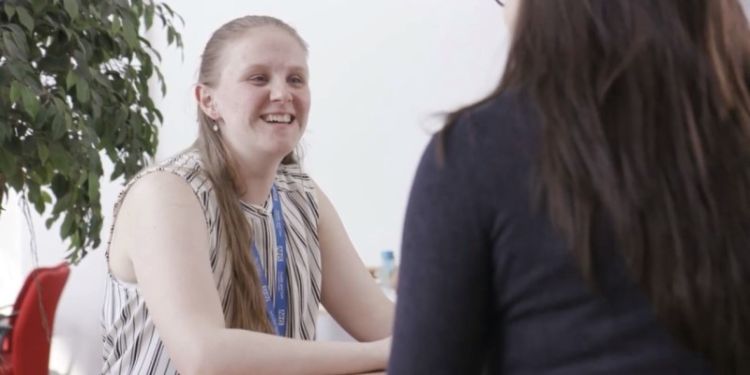
Nicola Perree
- Course: Chemistry and Mathematics BSc
- Year of graduation: 2020
- Job title: Cyber and Information Systems Graduate
- Company: Dstl
- LinkedIn: https://www.linkedin.com/in/nicola-perree-399250150/
Nicola Perree graduated from Leeds in 2020 with a BSc in Chemistry and Mathematics (Industrial variant). She is currently undertaking a graduate scheme at the Defence Science and Technology Laboratory (Dstl) in Cyber and Information Systems.
Undergraduate life at Leeds
During sixth form, Nicola really enjoyed both Mathematics and Chemistry, and wasn’t sure which subject she should choose to study at university. When she found the joint honours programme at Leeds, it seemed liked a perfect fit. She said, “It meant I could continue to study both subjects I enjoyed. At the time, the course wasn’t available at many universities as it wasn’t a very common combination, but when I visited the University of Leeds for an Open Day, I knew I could see myself studying here.”
I particularly liked the flexibility that the joint honours degree provided. It allowed me to study both subjects I was interested in and choose modules that focused on subject areas that complemented each other.
“I particularly liked the flexibility that the joint honours degree provided. It allowed me to study both subjects I was interested in and choose modules that focused on subject areas that complemented each other. I could choose to learn more about topics I was particularly interested in or excelled at. I also liked studying two subjects as it gave a bit more variety to my week, meaning I could take a break from working on one thing and do something a bit different instead.”
Industrial placement
During Nicola’s time at Leeds, she chose to undertake an industrial placement, and spent a year working at NHS England in the Data, Analytics and Intelligence Service.
The University of Leeds Careers Centre were very supportive, first in helping me figure out what I might be able to do and then with the application process.
“My placement year was definitely the most helpful thing for my career. By this stage in my degree I was enjoying the mathematics modules of my degree more and knew that I wanted to find a job where I could put my analytical skills to use. The University of Leeds Careers Service were very supportive, first in helping me figure out what I might be able to do and then with the application process.

The team I was based in provided a flexible analytical resource for priority projects, supporting and advising colleagues in other teams as well as investigating areas not covered by anyone else. This means that the work I did was varied both in subject matter and ranging from statistical analysis to more qualitative work. I had the opportunity to be involved in lots of different projects, allowing me to develop a variety of both technical and interpersonal skills. Some of the subject areas I worked on include health inequalities, life expectancy and cancer screening.
The thing I most enjoyed about my placement was knowing that the work I did directly contributed to the NHS and health policy. Furthermore, the skills and experience I gained during my placement year definitely helped me secure my graduate scheme as well as being helpful in my studies when I returned to university for my final year.”
The thing I most enjoyed about my placement was knowing that the work I did directly contributed to the NHS and health policy.
Life after Leeds
After graduating with a 2:1 Chemistry and Mathematics BSc (Industrial variant), Nicola is now working at the Defence Science and Technology Laboratory (Dstl) as a graduate in the Cyber and Information Systems division. Dstl is an executive agency of the Ministry of Defence, conducting research, providing expertise and developing science and technology.
“The work I do allows me to use and develop further both the mathematical skills from my degree and programming skills learned during my placement year. Through the graduate development scheme, I also have plenty of learning and development opportunities available to me so I can continue to explore different areas of science and technology.
So far I am really enjoying working at Dstl. Similar to my work for NHS England, I enjoy contributing to work that goes on the have real world impact. An example of the kind of project I work on is Stone Soup – an open-source software framework for tracking and state estimation methods. Stone Soup was designed as part of the Future Sensing and Situational Awareness Programme, aiming to work with both industry and academia to improve tracking technology. I work with others in my team on the continued development of the framework, making changes and updates to the code, collaborating via GitHub.”
I enjoy contributing to work that goes on the have real world impact.
Tips and advice
“Chemistry and Mathematics is a great degree choice if you want the flexibility of studying both subjects, or if you simply can’t make up your mind. When I started university I thought I mainly wanted to study Chemistry and keep doing some Mathematics mainly for interest – however by the end of my degree I had completed an analytical placement year, a final year project in Mathematics and had a graduate scheme lined up which focused on my maths and programming skills.
I’m so glad I chose this degree because it helped me figure out what I actually wanted to do and allowed me to change my mind. The School of Chemistry were also very supportive throughout my studies not only academically, but also personally and with my career development.”
Find out more
Discover more about our Undergraduate degree courses in the School of Chemistry.

